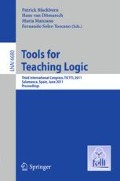Abstract
Although much of mathematics is algorithmic in nature, the skills needed to formulate and solve algorithmic problems do not form an integral part of mathematics education. In particular, logic, which is central to algorithm development, is rarely taught explicitly at preuniversity level, under the justification that it is implicit in mathematics and therefore does not need to be taught as an independent topic. This paper argues in the opposite direction, describing a one-week workshop done at the University of Minho, in Portugal, whose goal was to introduce to high-school students calculational principles and techniques of algorithmic problem solving supported by calculational logic. The workshop resorted to recreational problems to convey the principles and to software tools, the Alloy Analyzer and Netlogo, to animate models.
Access this chapter
Tax calculation will be finalised at checkout
Purchases are for personal use only
Preview
Unable to display preview. Download preview PDF.
References
Back, R.J., Mannila, L., Peltomaki, M., Sibelius, P.: Structured derivations: A logic based approach to teaching mathematics. In: FORMED 2008: Formal Methods in Computer Science Education, Budapest (2008)
Back, R.J., von Wright, J.: Mathematics with a little bit of logic: Structured derivations in high-school mathematics (2006)
Backhouse, R.C.: Mathematics and programming. A revolution in the art of effective reasoning. Inaugural Lecture, University of Nottingham (2001)
Backhouse, R.C., Hoogendijk, P.F.: Elements of a relational theory of datatypes. In: Möller, B., Schuman, S., Partsch, H. (eds.) Formal Program Development. LNCS, vol. 755, pp. 7–42. Springer, Heidelberg (1993)
Bird, R., Moor, O.: The Algebra of Programming. Series in Computer Science. Prentice-Hall International, Englewood Cliffs (1997)
Boute, R.: Using Domain-Independent Problems for Introducing Formal Methods (chapter 22). In: Misra, J., Nipkow, T., Karakostas, G. (eds.) FM 2006. LNCS, vol. 4085, pp. 316–331. Springer, Heidelberg (2006), doi:10.1007/11813040_22
Dijkstra, E.W.: On the economy of doing mathematics. note EWD1130 (1992)
Dijkstra, E.W., Scholten, C.S.: Predicate Calculus and Program Semantics. Springer, New York (1990)
Ferreira, J.F.: Principles and Applications of Algorithmic Problem Solving. Ph.D. thesis, School of Computer Science, University of Nottingham (2010)
Ferreira, J.F., Mendes, A.: Student’s feedback on teaching mathematics through the calculational method. In: 39th ASEE/IEEE Frontiers in Education Conference. IEEE, Los Alamitos (2009)
van Gasteren, A.J.M.: On the Shape of Mathematical Arguments. Springer Lect. Notes Comp. Sci, vol. (445). Springer, Heidelberg (1990)
Gries, D., Feijen, W.H.J., van Gasteren, A.J.M., Misra, J.: Beauty is our Business. Springer, Heidelberg (1990)
Gries, D., Schneider, F.: A Logical Approach to Discrete Mathematics. Springer, New York (1993)
Honsberger, R.: In Polya’s Footsteps: Miscellaneous Problems and Essays (Dolciani Mathematical Expositions). The Mathematical Association of America (1997)
Jackson, D.: Software Abstractions: Logic, Language, and Analysis. The MIT Press, Cambridge (2006)
Tisue, S., Wilensky, U.: Netlogo: A simple environment for modeling complexity. In: International Conference on Complex Systems, pp. 16–21 (2004)
Winkler, P.: Puzzled: Understanding relationships among numbers. Commun. ACM 52(5), 112 (2009), doi:10.1145/1506409.1506432
Author information
Authors and Affiliations
Editor information
Editors and Affiliations
Rights and permissions
Copyright information
© 2011 Springer-Verlag Berlin Heidelberg
About this paper
Cite this paper
Ferreira, J.F. et al. (2011). Logic Training through Algorithmic Problem Solving. In: Blackburn, P., van Ditmarsch, H., Manzano, M., Soler-Toscano, F. (eds) Tools for Teaching Logic. TICTTL 2011. Lecture Notes in Computer Science(), vol 6680. Springer, Berlin, Heidelberg. https://doi.org/10.1007/978-3-642-21350-2_8
Download citation
DOI: https://doi.org/10.1007/978-3-642-21350-2_8
Publisher Name: Springer, Berlin, Heidelberg
Print ISBN: 978-3-642-21349-6
Online ISBN: 978-3-642-21350-2
eBook Packages: Computer ScienceComputer Science (R0)

